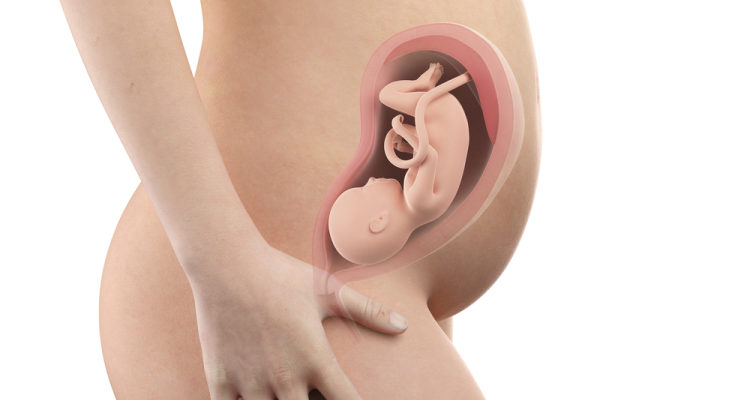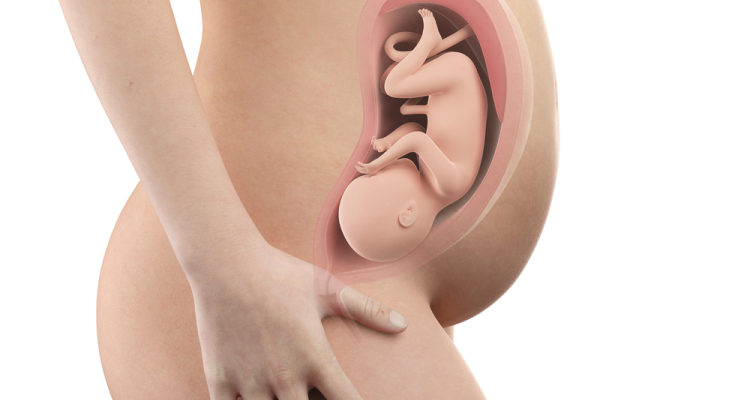Week 9

Many pregnant mothers wonder how their 9-week-old fetus has developed. So let's explore with aFamilyToday Health now!
During pregnancy, many pregnant mothers feel the fetus hiccup. This phenomenon sometimes makes you nervous. Let's find out.
After many months of pregnancy, the baby in the womb has grown a lot. Maybe by this time you have entered your second trimester and are beginning to feel your baby's movements. This makes you feel extremely happy and happy. The older your baby gets, you will see these movements more and more pronounced and surely you will be very surprised when you recognize your baby's sobs from inside. However, is the phenomenon of fetus hiccup good or bad? Please join aFamilyToday Health to continue to share the following to understand more about this situation.
Track and analyze the baby's movements in the abdomen, you will feel the baby's development and detect abnormalities. If you feel a steady jerky (like a ticking clock) or like a steady knock coming from the inside of your lower abdomen, don't worry too much because this is a sign that the fetus is hiccup. According to experts, hiccups are a normal phenomenon and not worrying as many people think. Even, this is also a sign that the baby's respiratory system is developing healthy.
The hiccups only happen when the baby's central nervous system has fully developed to be ready for breathing. In fact, the fetus can hiccup very early, in the early stages of pregnancy (around 9 weeks) but there is no evidence to support this because at that time the fetus is too young. It is not until the end of the second quarter and the beginning of the third trimester of pregnancy that you can feel this clearly.
Currently, experts still do not know exactly why the fetus has hiccups. Many people think that this condition is related to lung development, however, there are no scientific studies to prove this thinking is correct. Sometimes, a hiccup is simply caused by the baby trying to learn something new or it could be a sign that the baby is developing normally. Here are some common reasons:
Babies who often have a habit of "soccer" in the womb regardless of day and night are babies who really want to be born. The fetal hiccups are said to be due to the baby's impatience, just looking forward to coming out of the womb. The hiccup in the fetus is also a sign that the baby prepares for later breastfeeding skills. If when the baby is born, you see some small red blotches on the baby's skin, possibly because the baby is learning to suck, practice breastfeeding, leading to such hiccups.
Hiccups are the result of a fetus breathing in amniotic fluid. Like an adult, hiccups are also caused by abnormal movement of the diaphragm. Due to the young age, the fetus is not able to balance its swallowing and breathing rhythm. When swallowing or breathing, the baby will inhale or push the amniotic fluid out, causing hiccups.
In the womb, the fetus has formed its own personality, some babies are active, but there are babies quite quiet. Active babies often swing their arms, kick their feet, and are more active causing hiccups to occur more often. In addition, right from the womb, the baby has started to practice sucking reflexes. This process will help adjust the ability to suckle after birth and reduce the risk of lung obstruction.
If the fetus is hiccuped due to this reason, you should be mindful of the possibility that the baby is in danger. When the umbilical cord is pinched, the oxygen supply is limited or delivered too little, causing the baby to hiccup. In addition, it affects the heart and blood circulation to the fetus. If the phenomenon of hiccups has a sudden increase in frequency as well as severity, you should see a doctor immediately for timely consultation.
According to research, while in the womb, babies can hiccup frequently for a long time. You may begin to notice hiccups in the second and third trimesters. Each mother will feel her baby's hiccup at different times. In addition, there are babies who will often hiccup but others will not, so if you can't feel your baby's sob, there's no need to worry too much. However, if you notice hiccups after the 32nd week of pregnancy, you should see your baby because this is a sign that your baby is having a health problem that needs early intervention.
Scientists believe that the main cause of hiccups is that the baby cannot balance the rhythm of swallowing and breathing. When swallowing (or breathing), the fetus breathes in (or pushes out) some amniotic fluid. This process causes the diaphragm to contract, leading to hiccups. However, you should rest assured, just like the phenomenon of miscarriage, fetal hiccups in the womb is completely normal. The hiccups are also not a concern. Hiccups are not much of a concern because of the fact, some babies have quite a lot of hiccups every day.
Hiccups and miscarriages are both confusing phenomena because both make the mother feel the movements in the womb. However, if you look closely, you will see a difference:
Rhythm: If the fetus is hiccuped, you will notice every movement in the abdomen has a regular rhythm. And mechanical pregnancy happens randomly, not in a rhythmic cycle.
Time: Each time the baby hiccups last only about 3-5 minutes, while the fetus lasts from 30 minutes to 1 hour.
Level: In the 2nd trimester, the impact level when the baby is pregnant and when the baby hiccups are quite gentle. However, in the last 3 months, they have a big difference. When the baby hiccups, you only feel the gentle movements, but when the baby is pregnant, the baby will move very strongly, sometimes, you can also see the baby's feet and hands on the womb.
If you detect your child's hiccups, you do not need to worry too much and rush to see a doctor because this is a normal physiological phenomenon. You just:
Keep the spirit comfortable and optimistic
Maintain a sensible , resting regular diet
Many people think that hiccups are caused by hunger and thirst, so they try to eat a lot of something. However, this is not true and do not follow suit.
If the frequency of hiccups increases, you can try changing positions. For example, if you are lying on your left side, try turning to the right. If you are sitting to work, try getting up and walking a little. The changing position of the mother will help the baby feel more comfortable and minimize the hiccup state.
Hiccups are not painful to you, but they can distract you. Not only that, if your baby's hiccups last long, you may feel uncomfortable. Here are some tips from doctors to help limit hiccups:
Lie on your left side while sleeping
Maintain a nutritious diet with protein-rich foods as these can help your baby relax and less hiccups.
Drink plenty of water and keep your body moisturized
Get enough sleep
Count the number of hiccups and the time of each hiccup in the late stages of pregnancy to detect abnormalities early.
If you notice a sudden increase in your baby's hiccups with unusual movements, you should see your doctor immediately. Your doctor will probably recommend an ultrasound to find out the exact health status of your baby.
Through the above sharing, hope you have learned more about the phenomenon of fetus hiccups. If possible, consult your doctor more carefully about strange movements you may experience. Ultrasound can also be used to confirm hiccups in the fetus.
Ngan Pham / HELLOBACSI
Many pregnant mothers wonder how their 9-week-old fetus has developed. So let's explore with aFamilyToday Health now!
11 weeks fetus, baby's face continues to develop, mainly in the ear area, the head is about half the length of the body.
The development of the fetus changes with each stage. aFamilyToday Health shares with you everything you need to know about your 24-week-old fetus.
29 weeks pregnant will be the time when the mother is 7 months pregnant. During this time, the baby has reached a certain level of development in size, weight ...
The 33-week-old fetus was able to hear, feel and even see some. Baby can also dream at this stage!
Pregnant mothers often worry during labor. 3 exercises aFamilyToday Health will help pregnant mothers prepare for psychology and good health when pregnant women are in labor.
Learning about the effects of abortion on aFamilyToday Health tells you the link between abortion and its potential risks and when it is safe to get pregnant again.
How do mothers elect vitamin D supplements? Please share from an expert at aFamilyToday Health to know food sources and when to supplement this vitamin.
Join aFamilyToday Health to learn about eggs and sperm, how they meet, and about conception and the formation of the fetus.
aFamilyToday Health - A post about the breast changes of pregnant women and how to help you overcome the discomfort of these changes.








